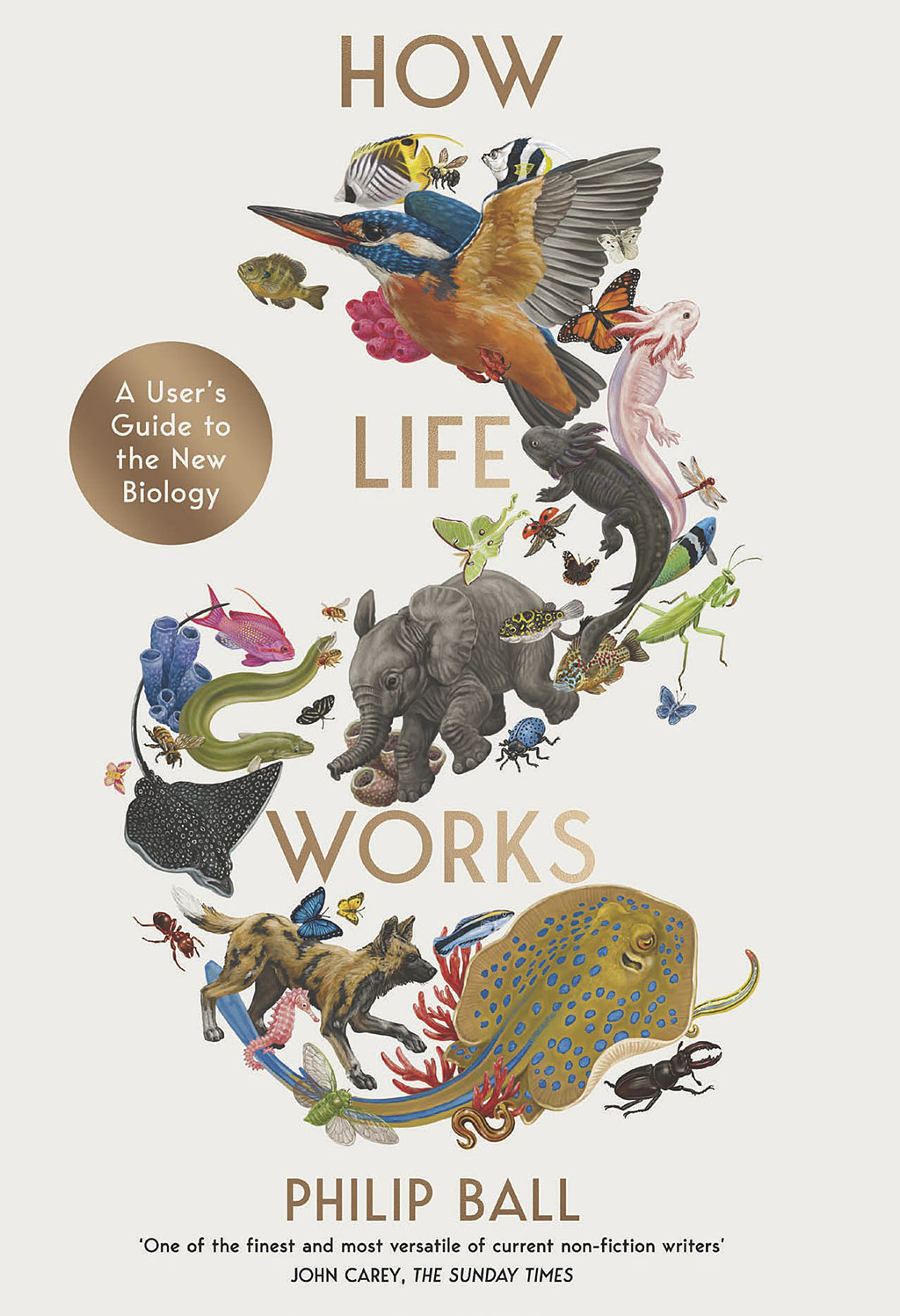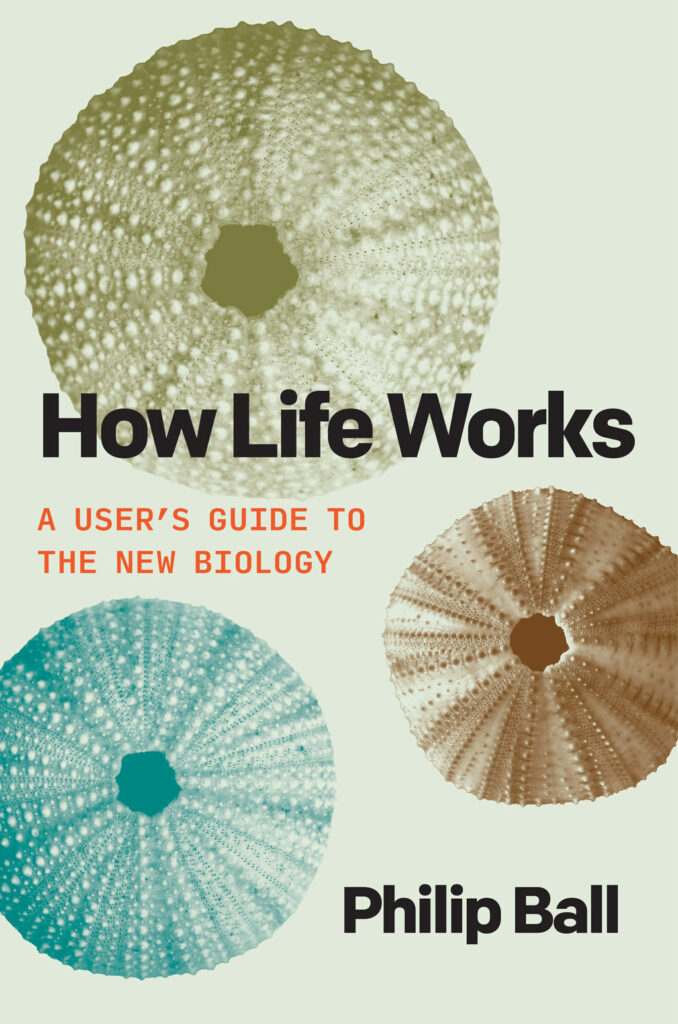 How Life Works: A User’s Guide to the New Biology by Philip Ball
How Life Works: A User’s Guide to the New Biology by Philip Ball
“There is so much that is amazing. When Ball tackles issues, any textbook chalkiness gets blown away… For Ball, the possession of agency — and purpose, and even meaning — is precisely how you might characterise life. Life, then, is not the servant of the selfish gene. Life happens at other levels. In the cell. In the organism. In us.”
James McConnachie, Sunday Times
“Ball’s marvelous book is both wide-ranging and deep. It explores the fundamental mechanics of biology and leaves the reader full of awe and wonder. More than this, by reframing how we talk about the latest scientific discoveries, How Life Works has exciting implications for the future of the science of biology itself. I could not put it down.”
Siddhartha Mukherjee, author of the Pulitzer Prize–winning “The Emperor of All Maladies”
“Nearly all the neat stories that researchers routinely tell about how living cells work are incomplete, flawed, or just totally mistaken,’ according to this bold report. Science writer Ball explains how advances in biology have upended traditional understandings of how organisms develop and reproduce. The most revelatory material pushes back against the notion that DNA constitutes the ‘blueprint’ for life. . . . The author takes glee in tearing down scientific shibboleths . . . and his penetrating analysis underscores the stakes of outdated assumptions. . . . Provocative and profound, this has the power to change how readers understand life’s most basic mechanisms.”
Publishers Weekly, starred review
“In showing that complex life is more ’emergent’ than ‘programmed,’ Ball takes on many conventional notions about biology. ‘We are at the beginning of a profound rethinking of how life works,’ he writes. Evolution has consistently invented new ways of creating living beings, and it will continue to do so. ‘The challenge,’ writes the author, ‘is to find a good way of talking about these vital stratagems,’ and his latest book offers plenty of food for thought for scientists in disciplines from medicine to engineering. A bold effort to create a new language that forces a ‘rethinking’ of ‘thinking itself.”
Kirkus Reviews, starred review
“Ball’s marvelous book is both wide-ranging and deep. It explores the fundamental mechanics of biology and leaves the reader full of awe and wonder. More than this, by reframing how we talk about the latest scientific discoveries, How Life Works has exciting implications for the future of the science of biology itself. I could not put it down.”
Siddhartha Mukherjee, author of “The Song of the Cell” and the Pulitzer Prize–winning “The Emperor of All Maladies”
“Ball has the rare ability to explain scientific concepts across very diverse disciplines. In his book How Life Works: A User’s Guide to the New Biology he employs that understanding to introduce the reader to the profound changes taking place in the life sciences. As researchers understand in ever-greater detail how sensitive, sophisticated, and purposeful different living organisms can be, Ball explains the turn away from a purely mechanical view of life to one that embraces the inherently dynamic, complex, multilayered, interactive, and cognitive nature of the processes by which life sustains and regenerates itself.”
James A. Shapiro, author of “Evolution: A View from the 21st Century. Fortified.”
“Ball’s new book offers a much-needed examination of exciting, cutting-edge findings in contemporary biology that is likely to dramatically transform our understanding of living systems—what they are (and, even more importantly, what they are not!), how they are organized at different levels, and the way they develop over time. It will be of interest not just to professional biologists and students of biology, but also to historians and philosophers of science, as well as to anyone curious to learn about the current state-of-play in twenty-first century life science.”
Daniel J. Nicholson, coeditor of “Everything Flows: Towards a Processual Philosophy of Biology”
“Ball is a clarifier supreme. It is hard to imagine a more concise, coherent, if also challenging, single volume written on the discoveries made in the life sciences over the past 70 years… How Life Works has a sense of up-to-the-minute authority. Yet Ball is also deeply alive to the human story within his project, leavening technical matters with wit and humour.”
Mark Cocker, The Spectator
“A robust and sustained takedown of the ‘simplistic’, ‘distorted’, ‘barren’ and ‘intellectually thin’ notion that biology is all about the gene… Ball is a ferociously gifted science writer… there is so much that is amazing. When Ball tackles issues, any textbook chalkiness gets blown away… For Ball, the possession of agency – and purpose, and even meaning – is precisely how you might characterise life.”
James McConnachie, Sunday Times
“Ball is a terrific writer, pumping out books on diverse subjects at a rate that makes me feel jealous and inadequate… the book serves as an essential primer on our never-ending quest to understand life.”
Adam Rutherford, The Guardian
“How Life Works is full of fascinating information… the dedicated reader will come away with many novel insights and a new perspective on what makes life special.”
Johnjoe McFadden, Times Literary Supplement
“[A] must-read user’s guide for biologists and non-biologists alike… It’s time to stop pretending that, give or take a few bits and pieces, we know how life works. Instead, we must let our ideas evolve as more discoveries are made in the coming decades.”
Denis Noble, Nature
“[This] lucid book suggests that before they can understand what really comprises life, biologists have first to unlearn a great deal of what they think they know.”
Michael Prodger, New Statesman
“Ball deftly explains how it’s possible to follow, in exquisite detail, how cells develop and specialise to form an organism. We are revising life constantly, and Ball’s account of synthetic biology takes us to this exciting frontier.”
David Whitehouse, Prospect
“This is Ball’s best by a mile (and that’s saying a lot)… [A] phenomenally fascinating exploration of the layered complexity of the development and workings of living organisms. The best biology book I’ve ever read.”
Brian Clegg, Popular Science
“Ball demotes the role of the double helix molecule, arguing that biology is far messier and marvellous than many scientists suspected… Ambitious and eye-opening.”
Debora Mackenzie, Financial Times
“Well researched, interesting, and stimulating, Ball’s very eloquent presentation… is a useful reminder to continue to interpret genetics and genomics with care.”
Michael Goldman, Science
“Bold and intriguing”.
Adrian Woolfson, Wall Street Journal

